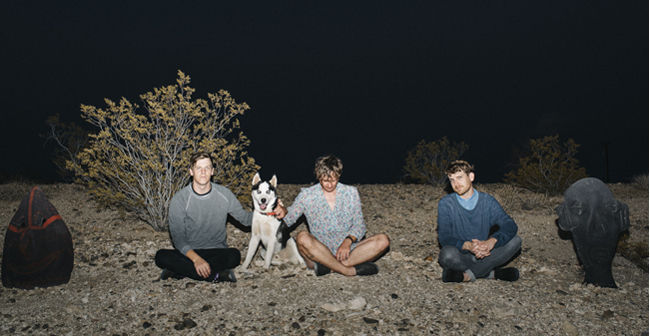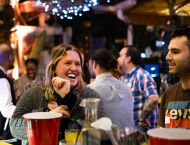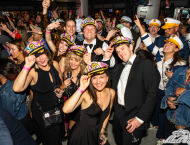Music
 Photo: Cara Robbins
Photo: Cara Robbins
Josh Hodges Talks 10 Years in STRFKR, Upcoming 9:30 Club Show
February 15, 2018 @ 12:00am
Best known for hit songs “Rawnald Gregory Erickson the Second” and “While I’m Alive,” STRFKR is throwing a high-energy dance party on Saturday night at 9:30 Club. Since Josh Hodges’ solo project began at house parties in Portland 10 years ago, he’s released 11 albums, toured all over the U.S. and built a reputation for insanely fun homemade lighting effects at his live shows.
Hodges’ latest release was 2017’s The Vault series, featuring three volumes full of unfinished songs from the 2007-2008 era that he salvaged from a 15-year-old computer. To prelude his sold-out show, On Tap got in touch with him to talk about the band’s 10-year anniversary, playing drums, Target commercials and his personal take on Buddhism.
On Tap: I read that you never really thought that STRFKR would become as big as it did, so that’s partially why you chose the name.
Josh Hodges: Both things are true, but not causally. I didn’t choose the name necessarily to not make it big, but I definitely chose it as a joke. It was just a solo thing for me to play house shows in Portland.
OT: As you were gaining more and more popularity, was there a moment when you realized that your music was reaching a lot more people than you ever thought possible?
JH: The first time I remember was when we played a festival in San Francisco that was really successful – like the biggest crowd we’d ever played in front of – and it was kind of trippy. I never thought we’d do this. And also getting to travel; we just did an Asia tour. That’s cool in that way too – meeting people in Thailand and Taiwan and China.
OT: What was going through your mind when one of your songs was featured in a Target commercial in 2009?
JH: That was like winning the lottery for me. That was what even enabled us to tour. It was super amazing, actually, even though I definitely felt like it was sort of embarrassing because there’s something about selling a song to a commercial [that] is a lame thing to do. But I also was pretty poor, and if I could make some money doing something that I actually like to do instead of making coffee for people, I think it’s a pretty good use of my time. And so I had to wrestle with it, but I feel way better about it now. I’m actually really grateful for it now because if that didn’t happen, maybe we still would’ve toured, but it really funded everything.
OT: I’m sure it got your name out more because people watching the commercial might have looked up your song if they liked it.
JH: That definitely happened, and that was a trip too. Many people at shows would say, “Oh, I heard your song on that Target commercial.” Man, that’s trippy.
OT: So, it’s STRFKR’s 10th birthday. Are you doing anything special for it?
JH: It’s not totally set in stone yet, but we’re planning a tour of the first cities that were supportive and special to us on our first couple of tours. We’re still going to do the whole first album front to back and some other stuff, but there’s a bunch of songs on the album that we’ve never played. It’s kind of crazy that it’s been 10 years. Time flies. It’ll be kind of a cool weird thing we’re going to do; we’re going to play at small clubs, like the clubs we used to play back then and just do a couple nights at them. We’ve never done anything like this.
OT: What can fans expect from your 9:30 Club show?
JH: We put a lot of time into working on the light show with this, and then we designed a bunch of stuff. We tried to switch up some songs we’ve been playing. We added a bunch of deep cuts, like some weirder B-sides and songs from The Vault period. I think people who have been coming to our shows for a long time will be happy because we’re changing the set around quite a bit; we’re trying to rotate out old songs and put in songs that we’ve either never played or haven’t played very much. If people request stuff on Twitter or whatever, we usually try to accommodate them.
OT: How important is it for you to have an engaging stage show, and what are some of your favorite moments while you’re performing live?
JH: I think it’s important for us because it’s kind of our thing; we’re known for having fun live shows. The fun part for me is when I get to play drums, because a lot of the project when it started was I would just write songs that were simple for me to play drums on because I like to play drums, but I’m not a great drummer. So I only play drums on a few songs, but that’s probably my favorite part. There’s a later part of the show where we have people dress weird and come out and dance and that’s fun – just seeing people’s reactions.
OT: I read that you went through a period of depression, and even though you were going through that, your music is mostly light and groovy. Is there any reason you felt like writing the way you did?
JH: That’s always been like the vibe with this project: feel-good music. The lyrics can be dark, but the music generally has a feel-good vibe. When I first started it, I had this idea where I don’t even really like to dance, but if people come to shows, even if they don’t like the music, but they can still dance [and] have fun. So I was trying to make it where it’s an even mix of that; where it’s still songs that are written and not played on a laptop but also danceable. Sorry, I’m walking around getting lost in Milwaukee right now. I’m trying to find a place to get a flu shot.
OT: That’s okay! Good luck with that. There’s a book by Buddhist monk Thich Nhat Hanh that helped you through your depression. I’m wondering what book that was and if you could talk about some of your favorite Buddhist principles.
JH: A lot of what he writes is pretty similar, but Being Peace was the book that I read that I really like. I was in a particularly dark place then and my dad gave me that book and I just started reading it and [Hanh] is really good at making Buddhism simple and accessible. It’s not super esoteric; it’s practical shit. My interest in Buddhism or Eastern philosophy has always been kind of practical. It’s actually useful to me and it can help change the way I engage with people, and a lot of depression for me was almost like obsession with my own suffering. And what I think is cool about it is it truly addresses a big spectrum of what’s difficult about being a human or being alive. It’s not necessarily satisfying answers, because a lot of times it’s about doing a difficult thing. It’s counterintuitive.
OT: Would you say that has affected the way you write your lyrics and music, or is that a separate thing for you?
JH: [For] a lot of the songs, especially in the first few albums, I wrote stuff about [Buddhism] because I was coming out of that depression when I first started the project and so I was definitely influenced by it. And even [in] a lot of the Alan Watts samples from a lot of the songs from the first album, I found a lot of that stuff to be really useful. Watts isn’t particularly great with that stuff, but he’s an entertainer. For me, using his voice and parts of his lectures in our songs is kind of vague; it’s like, “Oh, this is silly dance music.” But if someone resonates with it and ends up exploring it more, it may be useful. And I’ve met people who’ve said, “Oh, I found out Alan Watts because of your music,” and that totally makes it more meaningful to me to do this.
OT: Why did you decide to turn STRFKR into a trio instead of a solo project?
JH: I always liked the idea of it being a big extravaganza thing. It was easier to just get one person together because if I needed to book a show, it [was] easy. But it’s more fun and interesting to have other people in shows. I didn’t really know [Shawn] when he joined the band, but he’s been with me the longest. And then me and Shawn and this other guy did a tour, and we were like, “Wow, we need a real drummer.” And then we played with a band [that Keil] was in and we just kind of stole him, and then eventually we started touring a lot so he just started playing with us.
OT: What can people expect from STRFKR in the future?
JH: When I have time, I’ve been writing R&B stuff, and I still have a long way to go. A bunch of songs are started, but I don’t know when or how I’ll finish [them]. A lot of [them] are songs that I wrote when I was trying to write another record for STRFKR, but I thought about it and it wasn’t the right fit. Playing these songs live, it wasn’t going to be a party. So I still need to figure some things out with it.
Although STRFKR’s show at 9:30 Club is sold out, check out some of Hodges’ other tour dates here.
9:30 Club: 815 V St. NW, DC; 202-265-0930; www.930.com







